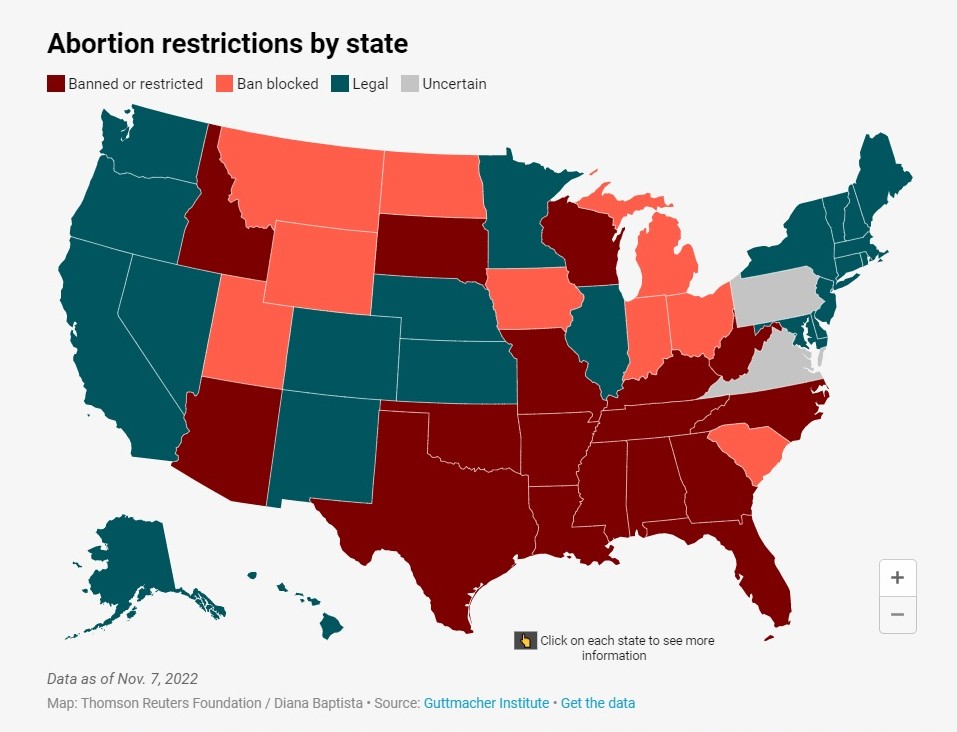- Mothering in a Fractured TimePosted 4 days ago
- Beneath the Surface: Revealing Life’s Goals nurtured from a Spiritual SeedPosted 7 days ago
- How We Kept Marital Peace while Traveling the World with Our KidsPosted 2 weeks ago
- How I Coped with Feeling Lost in a Changing SocietyPosted 3 weeks ago
- The Unexpected Liberation of a Butt DialPosted 2 months ago
- Why is France making abortion a constitutional right?Posted 2 months ago
Roe v Wade: Which US states are banning abortion?

By Emma Batha | Thomson Reuters Foundation Newsroom
What’s the context?
Abortion rights have become a key issue in the U.S. midterms as states impose a slew of bans across the country
________________________________________________________________________________________________
LONDON – Abortion rights have taken center stage in the U.S. midterm elections, as many states impose bans and restrictions following a shock Supreme Court ruling that rolled back nationwide rights.
In some states, the outcome of the Nov. 8 polls could directly impact a woman’s future ability to end a pregnancy.
In June, the Supreme Court handed states a free rein to make their own laws on abortion when it scrapped the 1973 Roe v. Wade ruling that had legalized the procedure nationwide.
About half of the country’s 50 states could ultimately ban or heavily limit abortion.
The decision has already activated so-called trigger bans in about a dozen Republican states which had passed legislation ahead of the ruling in the hope Roe would be scrapped.
Some states have also said that the court’s decision means their pre-1973 abortion laws are back in effect.
The bans have left women in swaths of the South and Midwest without nearby access to terminations.
Supporters of abortion say the bans, which have sparked a flurry of litigation, will hit women from poorer and minority communities hardest.
Abortion is likely to remain legal in liberal states. Three are holding separate ballots on Nov. 8 asking voters if they want to strengthen abortion rights in their state constitutions.
Here is a snapshot of moves to limit access in some states:
(To be able to click on each state to see more information click here and place cursor over state)
ALABAMA – The state passed a law banning abortion in 2019, but it only came into force after the Supreme Court ruling. Anyone convicted of carrying out an abortion faces up to life in prison.
The 2019 Human Life Protection Act compares abortion to historical genocides. Exceptions are allowed where a woman’s life is at risk.
ARIZONA – A ban on abortions after 15 weeks of pregnancy went into effect in September. An attempt to enforce a near-total ban dating from 1901 has been blocked by a state appeals court.
ARKANSAS – A trigger ban came into effect in June. Anyone who performs an abortion faces up to 10 years in prison, a fine of up to $100,000, or both. There is an exception if the mother’s life is in danger.
FLORIDA – A law banning abortions after 15 weeks took effect in July. Abortions had previously been allowed until 24 weeks.
The new law cut access to late-term abortions across the country’s southeast. Many women had previously traveled hundreds of miles to end pregnancies in Florida because of stricter laws in surrounding states.
GEORGIA – A law banning abortion when a fetal heartbeat is detected took effect in July. This is typically around six weeks – often before a woman knows she is pregnant. There are exceptions for medical emergencies and cases of rape or incest if a police report has been filed.
IDAHO – A trigger ban took effect in August. Anyone breaking the law can face two to five years in prison.
However, a federal judge limited the law in response to a lawsuit from President Joe Biden’s administration, allowing doctors to perform abortions when a pregnant person requires emergency care, even if their condition is not life-threatening.
A separate law allows relatives of a fetus that is aborted after a heartbeat is detected to sue the doctor.
INDIANA – In September, Indiana became the first state to introduce a new law banning abortion following the Supreme Court ruling. But enforcement has since been blocked while Indiana’s supreme court considers whether it violates the state constitution.
KENTUCKY – A trigger ban on abortion took effect in June. There are no exceptions for rape or incest. Anyone performing an abortion risks up to five years in prison.
Kentucky residents will also vote on Nov. 8 on whether they want the state constitution amended to make clear that it does not protect the right to abortion.
LOUISIANA – The state’s trigger ban went into effect in June. Anyone providing an abortion could face up to 10 years in prison and a fine of between $10,000 and $100,000. There is an exception when a woman’s life is in danger.
Confusion around the new law was highlighted after a woman who was pregnant with a baby with no skull said doctors refused her an abortion in a case that made headlines worldwide.
MISSISSIPPI – The state’s trigger ban came into effect in July. Anyone who performs an abortion risks up to 10 years in prison. There are exceptions if a woman’s life is in danger or in cases of rape or incest that have been reported to police.
MISSOURI – A trigger law which took effect in June banned all abortion except in medical emergencies. There are no exceptions for rape or incest.
Anyone performing an abortion could face five to 15 years in prison. Medical professionals could also lose their licenses.
NORTH DAKOTA – A judge has temporarily blocked the state’s trigger ban – due to take effect in August – following a legal challenge by an abortion clinic which says the law violates the state constitution.
The new law would ban all abortion except to save a mother’s life or in cases of rape or incest, with a maximum penalty of five years in prison and a $10,000 fine.
OHIO – A law banning terminations once a fetal heartbeat is detected came into force in July, but enforcement has been blocked pending a legal challenges by abortion providers.
The new law made headlines in July when a 10-year-old rape victim in Ohio was forced to travel to Indiana to get an abortion.
OKLAHOMA – In May, Oklahoma became the first state to ban abortion from the moment of fertilization. The law, passed in defiance of Roe v. Wade, also allows private citizens to sue anyone who helps women terminate their pregnancies.
A separate trigger law that came into force in August makes it a felony to provide an abortion, with penalties of up to 10 years in jail and a $100,000 fine.
SOUTH CAROLINA – A 2021 law outlawing abortion once a fetal heartbeat is detected came into force briefly after the Supreme Court ruling, but has since been blocked pending a legal challenge by abortion providers.
SOUTH DAKOTA – The state’s trigger ban, which took effect immediately after the Supreme Court ruling, outlaws all abortion except where a woman’s life is in danger.
TENNESSEE – A trigger ban took effect in August. Exceptions are made where a woman’s life is in danger or there is risk of permanent damage.
TEXAS – Anyone providing an abortion can face up to life in prison and a $100,000 fine under a trigger law that came into force in August.
Texas had already outlawed most abortions before the Supreme Court ruling. It made headlines in 2021 when, in defiance of Roe v. Wade, it banned terminations once a fetal heartbeat could be detected.
The law also unusually grants citizens the right to sue doctors who perform abortions beyond the cut-off mark. Citizens can collect $10,000 for successful lawsuits. The Biden administration has called this a “bounty”.
UTAH – A trigger law banning abortion has been blocked pending a legal challenge by abortion provider Planned Parenthood, which says the new law violates rights under Utah’s constitution.
WEST VIRGINIA – An abortion ban took effect in September, making West Virginia the second state after Indiana to enact a new ban since the Supreme Court ruling. There are exceptions for medical emergencies and in cases of rape or incest. Abortion providers risk up to 10 years in prison.
WISCONSIN – Abortion providers have ceased services because they are unsure whether the state’s pre-Roe abortion ban can be enforced, according to the Guttmacher Institute, an abortion rights advocacy research group.
WYOMING – A judge has temporarily blocked the state’s trigger ban following a legal challenge. She said the ban appeared to violate Wyoming’s constitution which protects a person’s right to make their own health decisions.
The contested ban carries punishments of up to 14 years in prison for abortion providers.
This article was updated on Nov. 7, 2022, to include the latest developments since the court ruling.
SOURCES: Reuters, U.S. state documents, Guttmacher Institute, ACLU
Context is powered by the Thomson Reuters Foundation Newsroom.
Our Standards: Thomson Reuters Trust Principles








